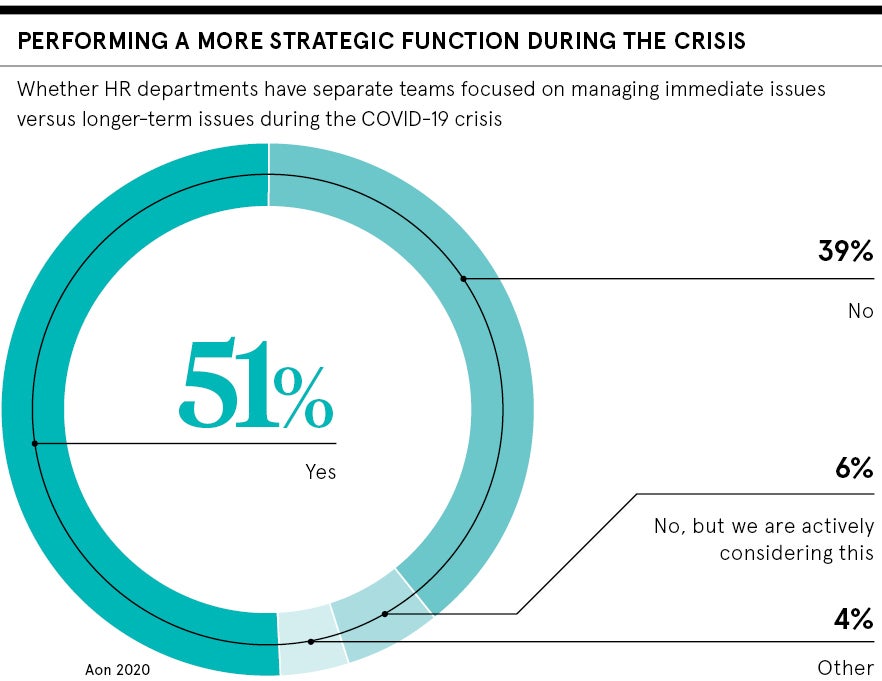When the coronavirus pandemic eventually fades into the history books, the strategic role of human resources professionals in keeping remote workers informed, in touch, productive and engaged will be the focus of business degree case studies.
Tasked with handling everything from troublesome technology and team-building to sickness, furloughs, poor mental health, low morale and even sudden bereavement, HR proved itself the go-to, unifying function in a crisis.
As lockdown morphs into unlock, the task of HR managers is to remain trusted advisers to the C-suite, taking a lead on issues such as flexible working, sometimes in the face of pushback. In short, to reinforce their role as the commercially driven conscience of the business world.
“As the nature of this crisis is human and about people, it has naturally put HR at the centre of the response from organisations,” says Peter Cheese, chief executive of the Chartered Institute of Personnel and Development (CIPD).
“Many positive changes can and should emerge, particularly by putting people much more at the heart of business thinking and strategy, and with a much stronger focus on wellbeing. HR has a very important role in ensuring these outcomes remain and we don’t just snap back to old cultures, paradigms and behaviours.”
A new focus on coaching for HR departments
Internal communications can be a challenge at the best of times and, when teams are geographically scattered, the job of unifying them in common goals and behaviours becomes that much trickier.
HR’s unrivalled expertise in remote communication and productivity, honed in the COVID-19 crisis, should be shared through closer collaboration with line managers, says Dean Hunter, founder of HR consultancy Hunter Adams.
“Many HR teams still sit behind computers, guiding email traffic around much of the time. What’s required now is for the profession to move away from the personnel model to become more of a coaching function, developing and generally helping managers step up to become leaders,” he says.
“The opportunities for driving change on flexible and agile working, accessing a more widespread talent pool, raising manager capabilities and flexible performance frameworks all provide HR with opportunities to raise credibility and add value.”
Despite praise heaped on the likes of Zoom, the live trial of remote technology, which in many organisations was untested when COVID-19 struck, hasn’t always been a walk in the park.
While inadequate broadband speeds and unreasonable management expectations have for some marred initiation into at-home working, the broader issue of who is and isn’t prepared to embrace this going forward is already weighing heavily on HR departments.

“These last few months have been the most incredible time for the status of the people function, but for those individuals who have struggled with remote tech or still refuse to engage with it, the coming period will be very hard,” says Andy Davies, senior vice president at global HR and analytics company MHR.
“How people managers cope with those folk who have to be dragged over the line to remain productive as we transition to widespread remote working will be a major test of the profession and could be critical to the standing of the function long term.”
HR managers must talk the language of business
While some leaders are already fully supportive of the strategic role of HR, others believe they themselves are the only true experts when it comes to motivating and engaging with their workforce.
Changing the hearts and minds of the C-suite, perhaps about the long-term benefits of remote working or even the strategic value of HR itself, requires an all-round understanding of business imperatives as well as access to solid data and analysis.
“If we can advise on aspects of HR that managers don’t understand, employment law for example, it encourages leaders to interact with the function and to partner with it; something we have seen clearly in COVID-19 as managers have looked to human resources to provide answers to a whole range of problems,” says Hunter.
“If you want to have a seat at the table, think about the things managers won’t have knowledge of and have something interesting to say about them.”
Understanding how the business works, how it makes money, what the margins are and its operating performance are also essential if HR leaders are to add real value.
“Having established that you understand the basics, you can go on to suggest how HR can contribute to the growth of the business and therefore increase the bottom line,” says Hunter. “By being commercial and talking the business’s language, building long-term reputation will be a given.”
Making the case for staying at home
Despite the growing appetite for remote-work options to comprise part of a standard contract, there will be leaders in all sectors who persist in pursuing the old policies of presenteeism and micro-management, even if this results in an exodus of hard-to-replace talent.
Pointing out what the competition is doing to cater for changing workforce expectations is one way to move the cultural dial.
But the CIPD’s Cheese cautions: “There will be some managers and leaders who are more comfortable with the traditional ways of working and have probably always been resistant to more flexible practices.” However, the recent and successful immersion in mandatory home working will, he hopes, have softened attitudes.
“The use of qualitative data from staff surveys, asking how people like the greater flexibility and how it impacts their work and their engagement, as well as more quantitative data about hours worked, absenteeism, downtime rates, productivity and output, will be game-changers for both the workforce and HR itself as the return to work gathers pace,” Cheese concludes.
A new focus on coaching for HR departments

